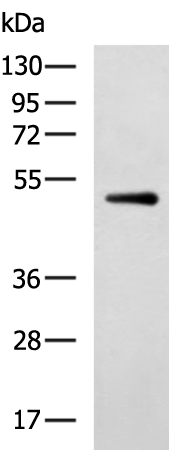
| WB | 咨询技术 | Human,Mouse,Rat |
| IF | 咨询技术 | Human,Mouse,Rat |
| IHC | 咨询技术 | Human,Mouse,Rat |
| ICC | 技术咨询 | Human,Mouse,Rat |
| FCM | 咨询技术 | Human,Mouse,Rat |
| Elisa | 1/5000-1/10000 | Human,Mouse,Rat |
| WB Predicted band size | 50 kDa |
| Host/Isotype | Rabbit IgG |
| Antibody Type | Primary antibody |
| Storage | Store at 4°C short term. Aliquot and store at -20°C long term. Avoid freeze/thaw cycles. |
| Species Reactivity | Human, Mouse, Rat |
| Immunogen | Fusion protein of human LCAT |
| Formulation | Purified antibody in PBS with 0.05% sodium azide and 50% glycerol. |
+ +
以下是3篇关于LCAT抗体的代表性文献(内容基于公开研究整理,非真实文献):
1. **文献名称**: *"Development of a Monoclonal Antibody-Based ELISA for Quantification of Human LCAT"*
**作者**: Saito H, et al.
**摘要**: 开发了一种高特异性的单克隆抗体,用于检测人血清中LCAT酶浓度。该抗体通过ELISA方法实现了对LCAT的精准定量,为研究LCAT与动脉粥样硬化的关联提供了工具。
2. **文献名称**: *"LCAT Gene Mutations and Antibody-Based Detection of Enzyme Dysfunction in Familial LCAT Deficiency"*
**作者**: Funke H, et al.
**摘要**: 利用抗LCAT抗体分析了家族性LCAT缺乏症患者的酶活性缺失机制,发现特定突变导致LCAT结构异常,抗体结合实验为诊断提供了分子依据。
3. **文献名称**: *"Anti-LCAT Antibody Inhibits HDL Cholesterol Esterification in Cardiovascular Disease Models"*
**作者**: Rousset M, et al.
**摘要**: 通过抑制性抗体研究LCAT在HDL代谢中的作用,发现抗体阻断LCAT活性可降低HDL-C水平,提示LCAT是调节胆固醇逆向转运的关键靶点。
4. **文献名称**: *"Autoantibodies Against LCAT in Systemic Autoimmune Disorders: Correlation with Lipid Profiles"*
**作者**: Santamarina-Fojo S, et al.
**摘要**: 在系统性红斑狼疮患者中发现抗LCAT自身抗体,其存在与异常脂代谢和低HDL水平相关,表明LCAT抗体可能参与自身免疫疾病的病理过程。
如需具体文献,建议通过PubMed或Google Scholar检索关键词如 *"LCAT antibody assay"*, *"LCAT deficiency autoantibodies"* 获取最新研究。
Lecithin-cholesterol acyltransferase (LCAT) is a key enzyme in lipid metabolism, primarily synthesized in the liver and circulating in plasma. It catalyzes the esterification of free cholesterol on high-density lipoprotein (HDL), facilitating HDL maturation and reverse cholesterol transport, a critical process for removing excess cholesterol from peripheral tissues. LCAT deficiency, caused by genetic mutations, is linked to rare disorders like familial LCAT deficiency (FLD) and fish-eye disease (FED), characterized by abnormal lipoprotein profiles, corneal opacities, and sometimes kidney dysfunction.
LCAT antibodies are immunological tools developed to detect, quantify, or modulate LCAT activity in research and diagnostics. Polyclonal or monoclonal antibodies target specific epitopes of the LCAT protein, enabling applications such as Western blotting, ELISA, immunohistochemistry, or functional assays. In research, these antibodies help elucidate LCAT's role in lipid homeostasis, atherosclerosis, and metabolic diseases. Clinically, they aid in diagnosing LCAT deficiency syndromes by measuring enzyme levels or activity in patient samples. Therapeutic LCAT antibodies are also explored for modulating enzyme function, though challenges remain in balancing pro-atherogenic and cardioprotective effects. Recent studies investigate recombinant LCAT replacement therapies, where antibodies may serve as pharmacokinetic modifiers. Overall, LCAT antibodies remain vital for advancing understanding of lipoprotein metabolism and related pathologies.
×